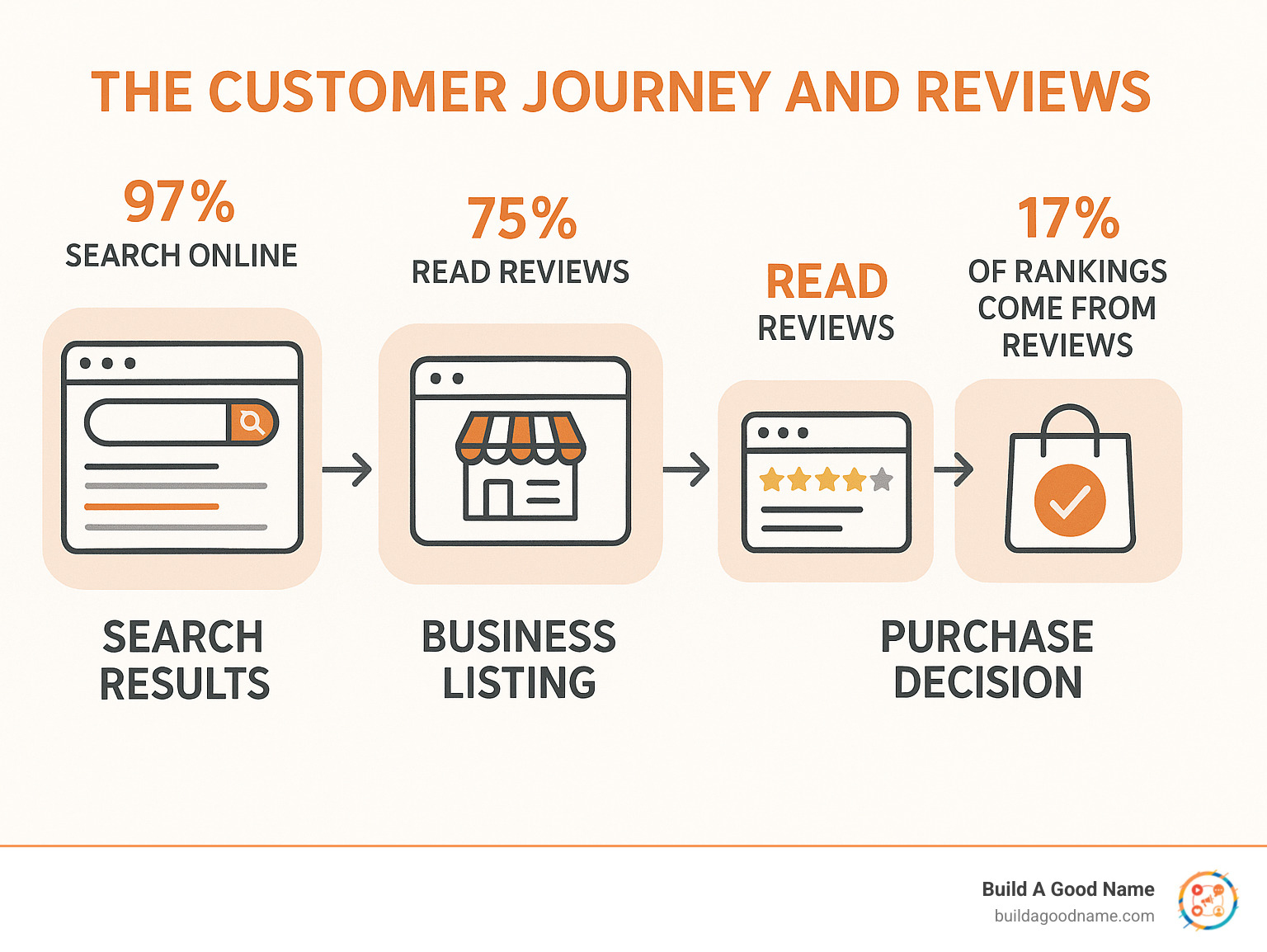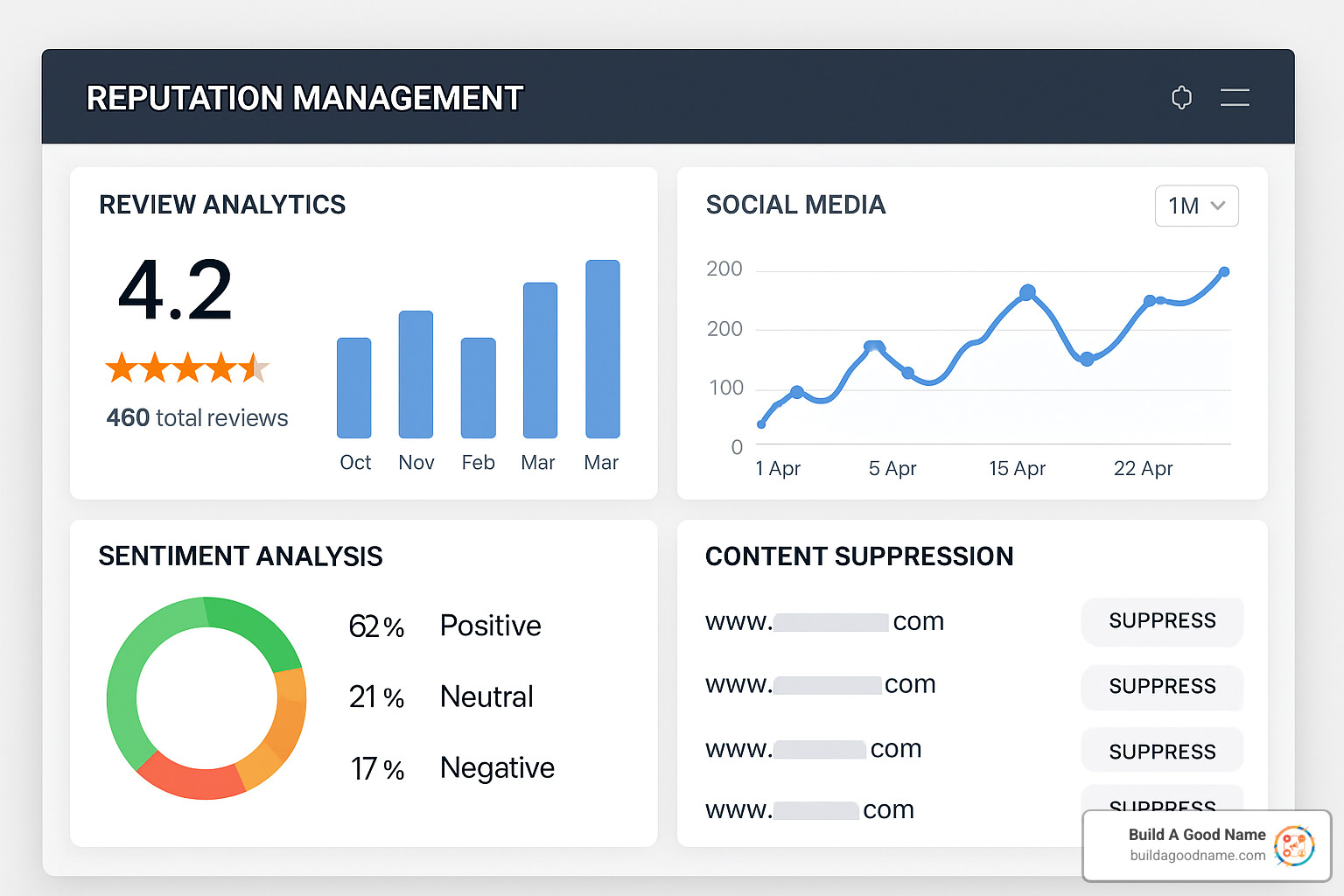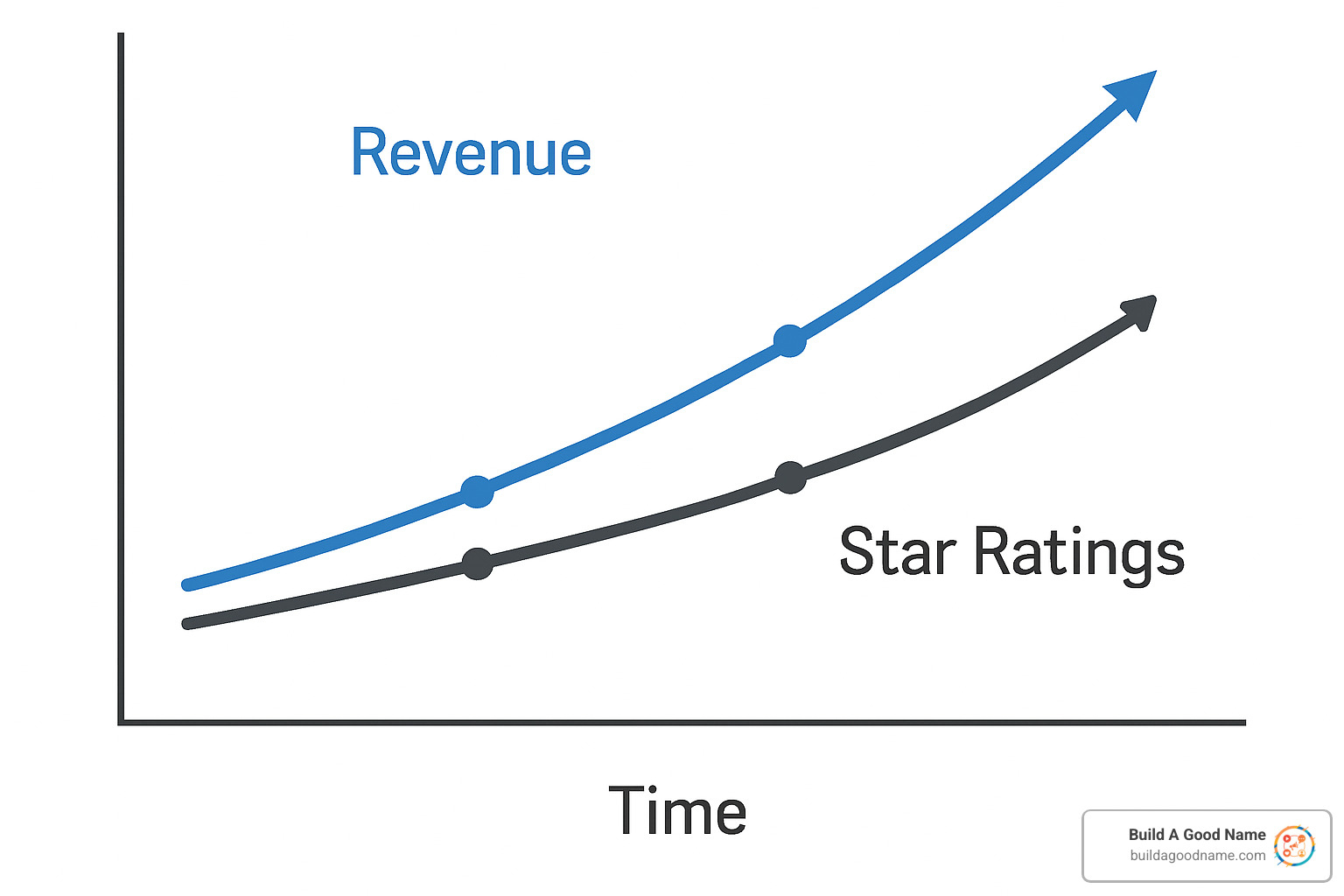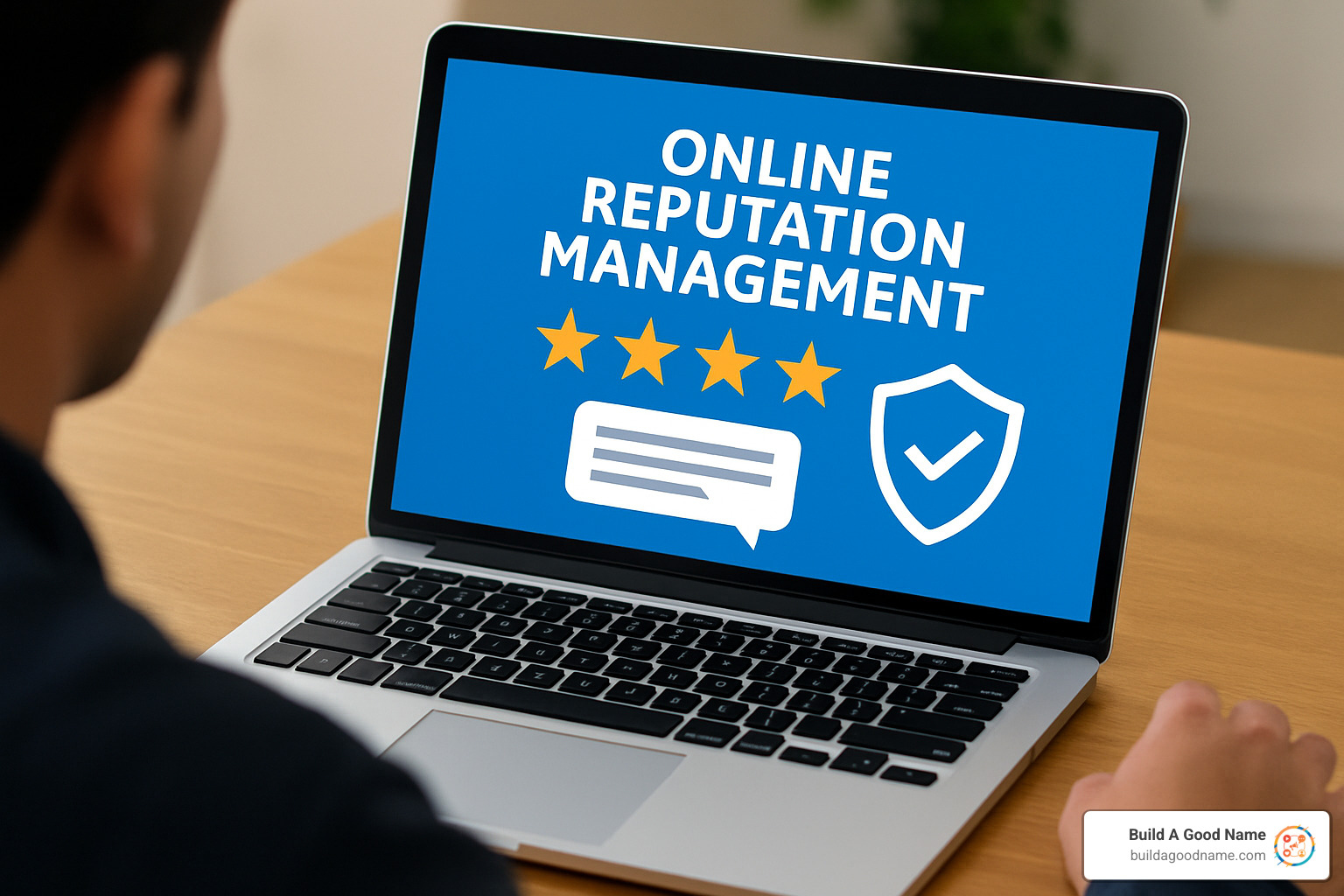Why Your Online Reputation is Your Most Valuable Asset
When online reputation management companies reviews become your lifeline, you know your business’s digital presence is in serious trouble. With 97% of consumers searching online for local businesses, your reputation isn’t just important—it’s everything.
What Different Providers Specialize in (2024 Overview):
- Comprehensive, full-service reputation programs
- Local business review acceleration platforms
- Agencies focused on content removal and suppression
- Enterprise-level monitoring suites
- Messaging-first tools for review collection
- Deep-dive analytics dashboards for multi-site monitoring
Here’s the reality: 75% of customers read online reviews before making a purchase. Even worse, 67% use multiple websites to research your business. That means one bad review can snowball across platforms faster than you can say “damage control.”
A telecommunications company that partnered with a leading reputation management agency saw its average rating jump from 2.0 to 4.6 stars while earning more than 6,000 new reviews—a staggering 1,300% increase. That’s not luck. That’s strategic reputation management.
But here’s what most business owners don’t realize: online reviews drive 17% of local search rankings. When your reputation suffers, your visibility plummets. When your visibility drops, your revenue follows.
The good news? The right reputation management partner can turn this around. The bad news? Choosing the wrong one can waste thousands of dollars and months of time while your reputation continues to tank.

The Anatomy of an ORM Service: What’s Under the Hood?

When you’re reading online reputation management companies reviews, you’ll notice they all talk about “comprehensive services” and “full-service solutions.” But what does that actually mean? Let’s peek under the hood to see what you’re really getting.
Think of a good ORM service like a skilled mechanic who doesn’t just fix problems—they prevent them too. Proactive management stops reputation issues before they start, while reactive management handles the fires when they inevitably break out. The best services seamlessly blend both approaches to protect your digital footprint and maintain positive brand sentiment across every platform where your business appears.
It’s like having a digital immune system that’s always working to keep your reputation healthy. When everything’s running smoothly, you barely notice it. But when trouble hits, you’ll be grateful for every component working in harmony. Understanding how Online Reviews and Reputation Management works helps you make smarter decisions about which provider deserves your trust.
Review Generation and Management
Getting great reviews isn’t about begging customers or bribing them with discounts. Smart review requests happen at exactly the right moment—when your customer is happiest with your service. The magic is in the timing and the personal touch.
Automated follow-ups have revolutionized this process. Instead of hoping you’ll remember to ask for reviews, the system handles it for you. One business saw a 63% response rate on feedback requests within two weeks, resulting in 18 new Google reviews. That’s the power of consistent, well-timed outreach.
But collecting reviews is only half the battle. Responding to feedback is where the real relationship-building happens. Every response shows future customers how you treat people. AI-powered systems can help draft personalized replies that sound like you, not a robot. This approach has helped countless businesses Generate More Google Reviews by making every customer feel valued.
The smartest systems also excel at showcasing positive reviews across multiple channels. When someone leaves you a 5-star review, it can automatically appear on your website, social media, and email campaigns. Review Management Software makes this seamless, multiplying the impact of every positive interaction.
Social Listening and Brand Monitoring
Your customers are talking about you online—the question is whether you’re listening. Social media mentions happen everywhere, from Twitter rants to Facebook recommendations to forum discussions you never knew existed.
Keyword tracking goes beyond just your business name. Smart monitoring catches variations, misspellings, and even conversations about your industry that could affect your reputation. It’s like having ears everywhere, picking up signals you’d never catch manually.
Sentiment analysis automatically sorts mentions into positive, negative, or neutral categories. Some platforms analyze over 1 billion pieces of content daily, providing insights that would take armies of people to gather manually. Real-time alerts mean you know about problems (and opportunities) the moment they happen.
Competitive insights and influencer identification round out the picture. Understanding how customers perceive your competitors helps you spot market opportunities and potential reputation risks before they become your problems.
Content Removal and Suppression
Sometimes the internet remembers things you’d rather it forgot. Negative content in search results can haunt your business for years, which is where content removal and suppression become essential.
Legal takedowns work best for clearly false or defamatory information. But legitimate negative reviews or news articles typically can’t be removed, requiring different tactics. Search suppression involves creating and optimizing positive content to push negative results down in search rankings.
SEO strategies for reputation management focus on pushing down negative results by elevating positive ones. Google Online Reputation Management is a marathon, not a sprint—the process can take 6-12 months or longer, depending on how stubborn those negative results are.
Success requires consistent content creation, strategic optimization, and the patience to let search engines recognize your positive content as more valuable than the negative stuff.
Crisis Management and PR
When reputation crises hit, having a plan isn’t optional—it’s survival. Public relations issues can explode from minor complaints into major brand disasters if handled poorly.
A solid crisis communication plan includes prepared response templates, clear escalation procedures, and coordinated messaging across all channels. The first 24 hours are critical. Response speed and message consistency can determine whether a crisis gets contained or spreads like wildfire.
Damage control isn’t just about putting out fires—it’s about preventing them. Smart crisis management involves monitoring for brewing problems before they explode. Brand recovery happens when you’ve learned from the crisis and come back stronger.
Mitigating negative press requires a delicate balance of transparency, accountability, and strategic communication. The businesses that survive crises best are those that respond quickly, honestly, and with genuine concern for their customers’ experiences.
The Ultimate Checklist: 7 Factors for Your Online Reputation Management Companies Reviews

When you’re drowning in negative reviews, every online reputation management companies reviews comparison feels like a lifeline. But here’s the thing—choosing the wrong provider can actually make your reputation problems worse while burning through your budget.
The vetting process doesn’t have to be overwhelming. We’ve distilled years of industry experience into seven critical factors that separate the winners from the time-wasters. Whether you’re exploring Reputation Management for Small Business or enterprise solutions, these factors will guide your decision.
Before diving into the checklist, consider this fundamental choice: DIY software versus full-service agency. DIY solutions offer lower costs and direct control but require significant time investment and learning curves. Full-service agencies provide expert strategy and hands-off management but come with higher costs and less direct control. DIY works best for tech-savvy teams with straightforward needs, while agencies excel at complex issues and crisis situations.
Factor 1: Strategy and Specialization
The biggest mistake businesses make is choosing a provider based on price alone. Strategy and specialization should be your first consideration, not your last.
Does the company focus on proactive reputation building or reactive damage control? The best providers excel at both, but their primary methodology reveals their true expertise. Proactive companies help you build a fortress of positive reviews before problems arise. Reactive specialists shine when your reputation is already damaged.
Industry expertise matters more than most business owners realize. A provider experienced in healthcare understands HIPAA compliance and patient privacy concerns. One focused on restaurants knows how to handle food safety complaints and seasonal review patterns. Generic approaches often fail because they don’t address the unique challenges your business faces.
Small business solutions require different approaches than enterprise-level strategies. Multi-location management involves unique challenges like maintaining brand consistency across diverse markets while addressing location-specific issues. Reputation Management Tools must scale appropriately to your business size and complexity.
Look for providers who can articulate their specific methodology for your industry and business size. If they give you a cookie-cutter presentation, keep looking.
Factor 2: Technology and AI Integration
Modern reputation management increasingly relies on artificial intelligence and automation to deliver results at scale. The question isn’t whether a provider uses AI, but how effectively they integrate it into their processes.
AI-powered response systems can generate Automated Review Replies while maintaining your brand voice and addressing specific customer concerns. However, the technology is only as good as the training data and oversight provided. The best systems learn your business’s unique voice and common customer issues.
Analytics dashboards should provide real-time insights into your reputation performance across all platforms. Look for providers who offer comprehensive reporting that goes beyond basic metrics to include sentiment analysis, competitive benchmarking, and trend identification.
The integration question becomes crucial: Can AI Respond to Online Customer Reviews? The answer is yes, but human oversight remains essential for complex situations and brand consistency.
Advanced sentiment analysis tools can predict potential issues before they become problems, enabling proactive intervention rather than reactive damage control. This technology transforms reputation management from firefighting to strategic brand building.
Factor 3: Transparency in Methods and Pricing
Nothing screams “scam” louder than a provider who won’t discuss pricing upfront or promises unrealistic results for unusually low fees. Transparency in methods and pricing separates legitimate providers from potential disasters.
Clear pricing models should be explained during your initial consultation. Typical ranges span from $500 to $10,000 per month, depending on service scope and business size. Software solutions start around $30-500 monthly, while full-service agencies charge significantly more for comprehensive strategies.
Ethical tactics should be clearly explained and documented. Avoid providers who suggest fake reviews, black-hat SEO techniques, or other methods that could harm your business long-term. Legitimate providers focus on generating authentic positive reviews and creating quality content.
Realistic promises are essential when evaluating online reputation management companies reviews. No provider can guarantee specific review counts or complete removal of all negative content. Be skeptical of anyone who promises overnight results or guarantees that seem too good to be true.
Understanding the cost structure helps you budget appropriately and avoid hidden fees that can double your monthly investment.
Factor 4: Reporting, Communication, and Results
You can’t improve what you don’t measure. Measurable KPIs should be established upfront, including review volume growth, average rating improvements, search result changes, or sentiment score increases. Without clear metrics, you’re flying blind.
Performance reports should be comprehensive and regular. Monthly reports typically include review summaries, sentiment analysis, competitive comparisons, and progress toward established goals. The best providers offer real-time dashboard access between formal reports.
Dedicated account management ensures consistent communication and strategic continuity. Your account manager should understand your business, industry, and specific reputation challenges. Regular check-ins and strategy reviews keep campaigns aligned with business objectives.
Case studies and proven track records provide evidence of capability. Look for providers who can share relevant success stories and quantifiable results from similar businesses. If they can’t show you real results, they probably can’t deliver them either.
Communication frequency matters as much as content quality. You should know exactly when and how you’ll receive updates, and your provider should be responsive to questions and concerns.
Factor 5: Review Management Capabilities
Review management forms the backbone of any successful reputation strategy. Review collection processes should be systematic and scalable, automating requests while maintaining personalization and appropriate timing.
Response strategy development goes beyond templates. Each response should address specific concerns while reinforcing your brand values. How to Respond to Google Reviews requires understanding both customer psychology and platform algorithms.
Negative feedback handling separates good providers from great ones. The ability to Filter Negative Reviews and respond appropriately can transform detractors into advocates. This skill becomes particularly important when evaluating online reputation management companies reviews.
Showcasing positive reviews across multiple channels maximizes the impact of every positive interaction. When a customer leaves a 5-star review, it should automatically be shared to social media, embedded on your website, and included in email marketing campaigns.
The best providers understand that review management isn’t just about quantity—it’s about creating meaningful connections with customers that drive long-term loyalty and advocacy.
The ROI of Reputation: Tangible Benefits for Your Business

When business owners first look at online reputation management companies reviews, they often focus on the monthly cost. What they’re really missing is the bigger picture: professional reputation management pays for itself through improved visibility, stronger customer relationships, and operational efficiency gains.
Think of it this way—you’re not just buying a service, you’re investing in your business’s future. The most successful companies we work with see reputation management as essential infrastructure, not an optional expense.
Here’s what makes the investment worthwhile: online reviews are responsible for about 17 percent of search engine rankings. That means your reputation directly controls how many potential customers can actually find you online. Better reputation equals better visibility equals more revenue.
The beauty of modern reputation management is that the benefits compound over time. Every positive review makes the next one easier to get. Every professional response builds more trust. Every improvement in your search rankings brings in more customers who leave more reviews.
Boost Your SEO and Local Search Visibility
Your Google rankings get a significant boost when you consistently manage your online reputation. Google’s algorithm pays close attention to review volume, recency, and sentiment when deciding which businesses deserve top spots in local search results.
The Google 3-Pack—those three businesses that appear at the top of local searches—heavily favors companies with active review profiles. More reviews, better ratings, and consistent response patterns all signal to Google that your business is trustworthy and relevant.
This creates what we call the “visibility snowball effect.” Better rankings generate more clicks, which lead to more customers, which result in more reviews, which improve your rankings even further. It’s a beautiful cycle that keeps building momentum.
Business listing accuracy becomes manageable when you’re working with professional systems. Inconsistent information across platforms confuses both customers and search engines. Professional reputation management ensures your Name, Address, and Phone number stay consistent across hundreds of platforms automatically.
The numbers don’t lie: local and organic searches together drive up to 69% of overall digital traffic. When you consider that most of this traffic comes from people ready to buy, reputation management becomes one of the most cost-effective marketing investments you can make.
Build Unbreakable Customer Trust
Brand credibility skyrockets when customers see you actively engaging with feedback. People trust businesses that demonstrate genuine care for customer satisfaction through thoughtful review responses and proactive reputation management.
The trust factor extends far beyond individual reviews. When customers notice you’re actively managing your reputation, they’re more likely to become advocates themselves. This creates organic word-of-mouth marketing that extends your reach without additional advertising costs.
Social proof becomes your secret weapon. Displaying positive reviews on your website, social media, and marketing materials provides third-party validation that’s infinitely more credible than any self-promotion. Customers believe other customers—not your marketing department.
Customer retention improves dramatically when people feel heard and valued. Customers who see you responding professionally to feedback—both positive and negative—are more likely to return and recommend your business to friends and family.
Save Time and Improve Accuracy
Centralized dashboard management eliminates the exhausting task of monitoring multiple platforms manually. Instead of checking Google, Facebook, Yelp, and dozens of other sites daily, professional systems aggregate everything into one manageable interface.
Automated workflows handle the routine tasks that eat up your day. Review requests, response acknowledgments, and follow-up communications happen automatically while maintaining the personal touch your customers expect.
AI-assisted responses maintain quality and consistency while dramatically reducing response time. The technology can draft appropriate responses that match your brand voice while addressing specific customer concerns. This ensures no review goes unanswered, even during busy periods.
The time savings translate to real cost reductions. While reputation management services require investment, they often reduce your total customer service and marketing costs by improving efficiency and effectiveness. Your staff can focus on serving customers instead of managing reviews.
For more insights on maximizing your reputation management ROI, check out our Blog where we share real-world case studies and proven strategies.
Frequently Asked Questions about ORM Services
How much do online reputation management services cost?
When businesses start researching online reputation management companies reviews, pricing is usually their first concern. The honest answer? It varies dramatically based on what you actually need and who you choose to work with.
Software solutions typically run $30 to $500 monthly. These give you the tools to manage reviews yourself, but you’ll need someone on your team to actually use them effectively. It’s like buying a gym membership—the value depends entirely on how much you use it.
Full-service agencies charge anywhere from $500 to $10,000+ per month. That’s a massive range because the scope of work can be completely different. A small restaurant managing Google reviews needs very different services than a healthcare system dealing with a PR crisis.
Several factors drive these price differences. Business size and complexity matter most—managing reputation for a single location is much simpler than coordinating across dozens of franchises. Service scope also impacts cost significantly. Basic review management costs far less than comprehensive crisis management with content removal.
Provider type creates another pricing tier. Software platforms cost less upfront but require more internal resources to manage effectively. Full-service agencies handle everything but charge accordingly. Contract terms can also affect pricing, with annual commitments often offering better rates than month-to-month arrangements.
For most small businesses, expect to invest $500-2,000 monthly for professional services that actually move the needle. Enterprise solutions cost more but typically deliver proportional value through improved efficiency and measurable results.
Is reputation management the same as public relations (PR)?
This confusion comes up constantly when businesses evaluate their options. While reputation management and public relations work together beautifully, they’re definitely not the same thing.
Public relations focuses on broad brand awareness. PR professionals build media relationships, secure press coverage, and position company leaders as industry experts. When a crisis hits, PR teams communicate with journalists and manage media narratives. It’s about building long-term brand positioning and thought leadership.
Reputation management focuses on direct customer feedback. This means monitoring online reviews, responding to customer concerns, optimizing search results, and managing platform-specific engagement. It’s about immediate customer satisfaction and the digital footprint customers see when they search for your business.
Think of it this way: PR helps people hear about your business through media coverage. Reputation management ensures what they find when they Google you afterward makes them want to buy from you.
The key difference lies in scope and timeline. PR builds broad awareness over months or years through media relationships and strategic positioning. Reputation management handles immediate customer interactions and feedback that affects purchasing decisions right now.
Most successful businesses use both strategies because they complement each other perfectly. PR creates positive brand awareness while reputation management ensures individual customer experiences support that broader narrative.
How long does it take to repair a damaged reputation?
This might be the most important question in all of online reputation management companies reviews. Unfortunately, there’s no universal timeline because every situation is different.
Immediate improvements typically happen within 1-3 months. You’ll see increased review volume through systematic collection, better response rates from improved customer service, and improved social media engagement. These quick wins help stop the bleeding while longer-term strategies take effect.
Medium-term results appear around 3-6 months. Your average ratings start improving noticeably, positive review volume increases consistently, and search results begin showing more diverse content. Customer sentiment trends also shift positively during this period.
Long-term change takes 6-12 months or longer. This is when you see significant search result improvements, established positive content dominance, and sustainable review generation systems. For most businesses, complete reputation recovery happens in this timeframe.
Content removal and suppression represent the longest timeline. Pushing down negative search results through SEO strategies typically takes 6-12 months minimum, depending on how authoritative the negative content is and where it’s published. Some particularly challenging situations can take even longer.
The severity of your reputation damage significantly affects timeline expectations. A few negative reviews can be overcome relatively quickly with systematic positive review generation. A viral social media crisis or major news coverage requires much more time and comprehensive strategy.
Proactive versus reactive approaches also impact timelines. Businesses that start reputation management before problems occur see faster results than those trying to recover from serious damage. Prevention is always faster and cheaper than repair.
The key is maintaining realistic expectations while staying committed to the process. Reputation repair is a marathon, not a sprint, but the long-term benefits make the investment worthwhile.
Conclusion: Taking Control of Your Digital Narrative

Here’s the bottom line: your online reputation isn’t just about collecting five-star reviews. It’s about taking control of your digital story before someone else writes it for you.
The numbers don’t lie. When 97% of consumers search online for local businesses and 75% read reviews before making purchase decisions, your digital reputation literally determines whether customers find you or your competitors. Add in the fact that online reviews drive 17% of local search rankings, and you start to see why reputation management isn’t just nice to have—it’s business survival.
Telecommunications company we mentioned? They didn’t stumble into 1,300% review growth by accident. They made a proactive choice to partner with professionals who understood that systematic reputation building beats reactive damage control every single time.
When you’re evaluating online reputation management companies reviews, think of it as a long-term investment in your business’s future. The right partner doesn’t just fix problems—they prevent them from happening in the first place.
Your due diligence matters here. Look for providers who demonstrate transparency in their methods, offer realistic timelines, and can clearly explain their strategy for your specific situation. Avoid anyone promising overnight miracles or guaranteeing results that sound too good to be true.
The best reputation management partner becomes an extension of your team. They work continuously behind the scenes, protecting and improving your digital presence while you focus on running your business. Whether you choose software solutions or full-service agencies, consistency and professional management make all the difference.
At Build A Good Name, we’ve seen how AI-powered review management transforms businesses across Lake Elsinore and beyond. Our automated, personalized approach helps businesses build stronger reputations through systematic review collection, intelligent response management, and advanced filtering that highlights positive feedback where it matters most.
Your reputation is your most valuable asset. It deserves the same attention and investment you give to any other critical business function. Protect it, nurture it, and watch it drive sustainable growth for years to come.
Take control with our Review Management Software and find how the right tools can transform your online presence from liability to competitive advantage.
The choice is simple: take control of your digital narrative or let others write your story. We know which one we’d choose.
For more insights and strategies to protect and grow your business reputation, explore our comprehensive Reputation Management Category resources.



